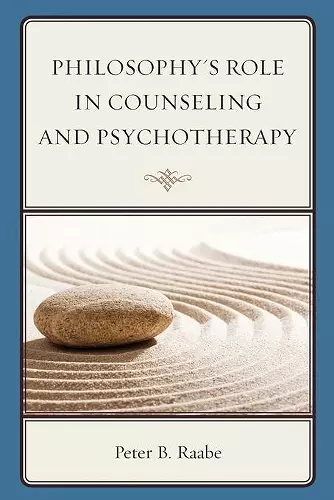Philosophy's Role in Counseling and Psychotherapy
Format:Paperback
Publisher:Bloomsbury Publishing PLC
Published:2nd Apr '15
Currently unavailable, and unfortunately no date known when it will be back
This paperback is available in another edition too:
- Hardback£110.00(9780765709172)

In Philosophy's Role in Counseling and Psychotherapy, Peter Raabe argues that philosophy is an effective method in treating mental illness. Calling for a paradigm shift away from the standard belief that the brain and mind are identical Raabe argues that so-called “mental illnesses” such as depression and schizophrenia are not the actual causes of psychological misery. Instead, they are just labels for symptoms. For example, the word “depression” is merely a label attached to a collection of symptoms such as sadness, hopelessness, and low self-esteem. Raabe posits that distressing or painful life events can cause symptoms that are often clinically labeled as the mental illness of depression. The suffering brought on by painful life events can often be alleviated with helpful discussions, and without resorting to medications. Because philosophy is the foremost form of discussion, it means that the suffering that is labeled mental illness can be treated and even cured with philosophy. Raabe ultimately concludes that philosophy is beneficial in three ways: it can prevent the onset of a so-called mental illness in the person who studies it, it can be used to help individuals suffering from the distress that is labeled “mental illness,” and it will enhance the competence of the counselor or therapist who practices it.
I heartily recommend this book to all students whose aim is to work in the field of mental healthcare. Philosophy's Role in Counseling and Psychotherapy could also be very helpful for the general public in raising awareness of how philosophy may show the way out of some of the mental dilemmas and distress created and caused by the self and society. I can recommend this easily readable, understandable and yet very authoritative book for anyone who is interested in mental healthcare. But, this book is especially of interest for academicians and the students of psychology, counseling, psychiatry and philosophy who wants to have a better understanding of the nature of mental health and its relevance to philosophical insights from early Greeks to our day. I believe it will make an excellent textbook and a source book for scholars. * Metapsychology Online *
This book restores the philosophical wonder of theorizing about psychotherapy. Peter Raabe presents different dilemmas of the helping professions in a dignified and humane way by making problematic issues questionable and understandable. With this dose of philosophy in clinical encounters, professional and would-be therapists alike might be more attuned to finding just solutions for human predicaments. Philosophy’s Role in Counseling and Psychotherapy could also be helpful for the general public in raising awareness of how philosophy may show the way out of some of the mental prisons created by the self and society. -- Shlomit C. Schuster Ph.D., author of Philosophy Practice: An Alternative to Counseling and Psychotherapy
Professor Peter Raabe analyzes conceptual confusions, methodological flaws, logical fallacies, and biased considerations that are committed by psychiatrists, psychoanalysts, and psychotherapists when they are interpreting and treating mental suffering according to a medical model. His proposed paradigm shift is the philosophical counseling approach. The impact of philosophy is indeed already present in any sort of psychotherapy and counseling that takes into account the specific nature of the mental domain and deals with subjective contents and attitudes that interfere with the client's ability to cope well in situations that are problematic from his perspective. The founders had knowingly adopted philosophical ideas. Professor Raabe maintains, however, that the impact itself is insufficient, as regular psychotherapists and counselors usually do not have the philosophical knowledge and skills that are necessary for their effective application. Raabe demonstrates his counseling approach in many inspiring ways and thereby exemplifies the richness of the philosophical arsenal in helpful questions and effective tools. This is a good source of wisdom even for psychiatrists that do not share all the anti-medical conclusions and a real challenge even for philosophers that do not share all the philosophical premises. -- Ora Gruengard
ISBN: 9781442250857
Dimensions: 226mm x 153mm x 30mm
Weight: 608g
416 pages